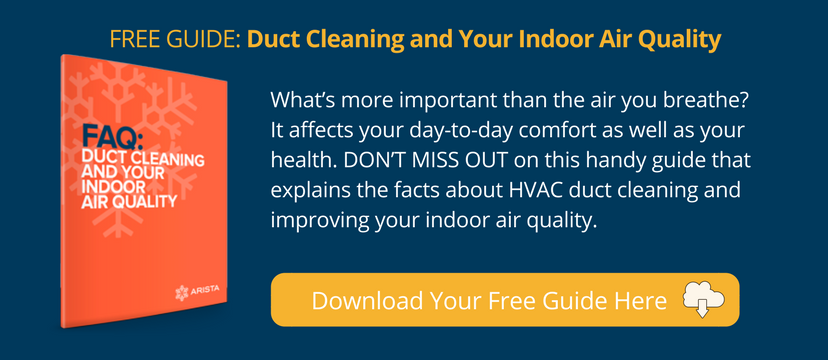While many are concerned about outdoor air quality due to wildfire smoke polluting the air, we also need to be concerned about the air we breathe indoors. That’s a good reason to consider new technology that can improve indoor air quality, including an HVAC air purifier and air filtration system.
According to the federal Environmental Protection Agency, the air inside can be at minimum 2 to 5 times (and up to 100 times!) more polluted than outside. It’s not only smoke and smog that threatens the safety of indoor air, it’s also VOCs, mold, bacteria, and viruses.
Here’s how an HVAC air purifier can help promote good health by improving air quality in your home and workplace.
So, what exactly does a central air purifier do?
An HVAC air purifier = fresh air
While ordinary paper filters in many central HVAC systems help remove dust from the air, these basic filters do not remove tiny particles that can harm your health. You can consider standalone air purifiers, but those can be loud, unsightly, and they only clean the air in small areas.
Central air purification systems are installed in your HVAC ductwork, making them invisible and quiet. They remove dust, mold, bacteria, viruses and other contaminants from the air throughout your entire space.
How you benefit from an HVAC air purifier
Is the installation of an HVAC air purifier worth it? If breathing clean air is a priority for you, then it certainly is. For allergy and asthma suffers and those with chronic respiratory problems, the installation of an air purifier should be an even stronger consideration.
Here are some of the things an HVAC air purifier can do for your home or business:
- Trap bacteria and viruses to prevent the spread of germs and illnesses
- Trap pet dander and other allergens
- Block dust mites/dust
- Remove dangerous volatile organic compounds from the air
- Neutralize smoke from your fireplace or from smoked tobacco products
- Remove unpleasant odors emanating from places like kitchens, rest rooms, and trash cans
When should you consider getting an HVAC air purifier?
Are you concerned about the spread of germs and toxins in your workplace and want to protect your employees and customers? There are specific types of HVAC air purifiers that can make a big difference.
Businesses using volatile organic compounds (VOCs) are prime candidates for an HVAC air purifier (such as salons, furniture refinishing businesses, print shops, dry cleaners and auto body repair shops). Just about any business where cleaning chemicals or printers are used, there will be VOCs in the air.
Have you done your best to maintain a dust-free, clean environment but still suffer from allergies and other respiratory ailments? Consider installing an HVAC air purifier. If there is a smoker in the house, adding a central air purifier would be a wise investment in your health.
Types of HVAC air filtration and air purifier technology
Not all HVAC air purifiers do the same thing. Here’s a primer on the different types of technology to help you choose what’s right for your space.
HEPA
One of the most common types of an HVAC air purifier system utilizes a heavy-duty HEPA (High Energy Particulate Air Filters) filter to trap many types of particles. HEPA filters can trap more than 99-percent of airborne particles .3 microns and larger in size from entering your breathing space.
However, the downside is that not every system can accommodate a HEPA filter, and they can cause performance problems for your system.
Carbon Activated Filters
A carbon activated filter is a good choice for VOC, smoke, and odor removal. These filters contain tiny absorbent pores to trap contaminants as they pass through the filter.
HVAC ultraviolet light air purifier
Ultraviolet technology is often used in conjunction with HEPA air purifiers. An HVAC ultraviolet air purifier can kill tiny microorganisms, such as bacteria, using rays of UV light.
Electrostatic air purifiers
Many HVAC air purifiers also contain electrostatic fields to capture microscopic particles, including viruses. Electrostatic air purifiers clean the air by using static electricity. An electrostatic charge is generated by air flowing through a network of static-prone fibers. The static charge traps airborne particles until the filter is washed.
Ionizing air purifiers
An ionizing air purifier produced charged particles that attract and capture particles in the air. Groups of tiny particles stick together and become too heavy to remain airborne, or they get captured by the HVAC filtration system.
Arista is providing the latest HVAC air purification devices that offer a combination of technologies so you get the most effective air purification for your space.
Learn more:
REME HALO: The Best Whole Home Air Purifier
ALSO: Consider duct cleaning for air purification
If you suspect your HVAC system is not providing your home or business with optimal air quality, it is smart to invite an HVAC expert in to clean your system’s ductwork. Ducts can harbor all sorts of nasty stuff including dust, mold and mildew, which will hurt your air quality.
Do you need your ducts cleaned? Find out more from this guide.
Maintain your HVAC air purifier
Maintenance is key to air purifier effectiveness. Many HVAC air purifier systems rely on filters. After a while, these filters become clogged with a variety of debris and contaminants, making them less effective. Replace disposable filters on a timely basis. Or, remove and hose down reusable filters regularly.
To find out more about filter changing, check out these related articles:
What Happens When You Don’t Change The AC Filter
Why and How to Change an AC Filter
HVAC professionals like Arista Air can help you determine when your filters need replacing, based on your equipment and your air quality challenges. Arista experts can also help you select an HVAC air purifier that is right for your home or business.
To get started right away, request a no obligation consultation to discuss your needs and get recommendations from our experts.


